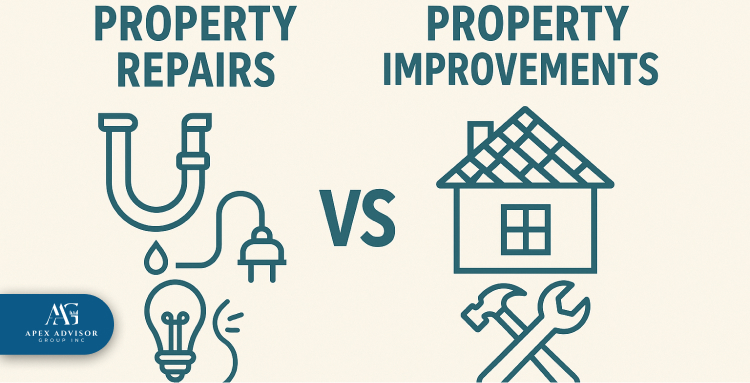How to Prepare Real Estate Financial Statements for Tax Filing

July 19, 2025
Rental income looks simple at a glance. Tax season, however, tells a different story. Behind each payment is a stack of expenses, loan details, and repair records that all need to be accounted for. Without clear financial statements, tax filing can turn into a complex challenge.
Now, let's see how to prepare real estate financials that keep everything clean, compliant, and ready for filing.
1) Collect Your Property Records
Before you begin preparing your tax filings, it’s important to gather all the property-related records that will help you handle the process easily. Here's a look at what you need to have on hand:
Lease Agreements or Rental Contracts
Start by collecting your lease agreements or rental contracts. These documents lay out the terms of your rental arrangements and confirm the amount of income you're receiving from tenants. They also clarify any important conditions that could affect your financial reporting.
Proof of Rent Received
You'll need to gather proof of rent received, which can include bank statements showing deposits or receipts from tenants. This documentation ensures your rental income is properly tracked and helps you verify the amounts you're reporting on your tax return.
Utility Bills, Repair Invoices, and Maintenance Logs
Keep track of any utility bills, repair invoices, and maintenance logs related to your property. These records substantiate the operational expenses of running your property and could be used for deductions. They provide clear evidence of the ongoing costs required to maintain the property, which are necessary for accurate reporting.
Mortgage Statements
Don’t forget to collect your mortgage statements for the year. This includes details of both interest and principal payments made during the year. The mortgage interest paid can be deducted, which can be beneficial when it comes time to file your taxes.
Insurance and HOA Fees
If your property is covered by an insurance policy, make sure you have those records handy. Similarly, if you're subject to Homeowners Association (HOA) fees, keep track of those payments as well. Both of these can often be deducted, so it's important to stay organized and keep these records in a central location.
Property Tax Bills
Lastly, gather your property tax bills for the year. Local counties, such as Miami-Dade or Orange County, can issue these depending on your property’s location. These tax bills are another source of deductions, so it's important to have them readily available when filing.
2) Write Down All Income

Ensuring that every bit of income from your property is accurately recorded is an essential step in preparing for tax filing. Here’s how to break it down:
Rent Received
Begin by documenting the rent received throughout the year. This is the primary income source for most property owners, and it’s crucial to track all payments, even if they’re made in installments. Each payment, no matter how small, should be noted to ensure complete and accurate reporting.
Fees Paid by Tenants
Next, include any fees tenants have paid.. These might include late fees, parking fees, or other charges tenants are required to pay under the terms of their lease agreement. While these additional fees are often overlooked, they count as income and should be reported to avoid any discrepancies.
Refunds or Credits
Lastly, make sure to account for any refunds or credits you’ve issued to tenants. If, for example, you refunded part of the rent or gave a credit for maintenance issues, these transactions must be recorded. While they may reduce your total income, including them ensures that your financial records are precise.
3) List All Expenses
Now that you've captured your income, it's time to focus on the expenses that can be deducted from your rental property’s earnings. Here's a rundown of common expenses you may be able to deduct in Florida:
Mortgage Interest: One of the biggest deductions you can claim is mortgage interest. If you’re paying interest on a loan for the property, that portion of your mortgage is deductible.
Repairs (Not Improvements): Don’t confuse repairs with improvements. Repairs are the costs associated with fixing or maintaining your property (think plumbing or electrical work), and these can be deducted. On the other hand, improvements like remodeling or adding new features need to be capitalized and depreciated over time.
Lawn Care or Pool Maintenance: If you’re paying for lawn care or pool maintenance, those costs are considered part of your property’s operational expenses.
Property Management Company Fees: These fees cover the cost of managing the property, handling tenants, and overseeing maintenance.
Utilities (If Landlord-Paid): If you're paying for utilities like water, gas, or electricity, those costs are deductible.
Legal and Accounting Fees: Any legal or accounting fees incurred in relation to the property are deductible as well.
Property Insurance: Your property insurance premiums are another expense you can deduct. These cover the cost of insuring your property against damage, theft, or liability claims.
Property Taxes: Be sure to keep your tax bills handy, as they can lower your taxable income. These are often paid directly to the local county, like Miami-Dade or Orange County, and can be easily tracked through your bills.
State Business Registration or Local License Fees: If you're renting your property on a short-term basis, you might also need to pay state business registration or local license fees. These fees are deductible and should be recorded to ensure your filing is complete.
4) Depreciation

Depreciation is a powerful tool when it comes to reducing your taxable income. In Florida, as per IRS rules, depreciation is handled a bit differently depending on the type of property. Here's what you need to know:
Residential Buildings: For residential buildings, the IRS allows you to depreciate the property over 27.5 years. This means you can deduct a portion of the property’s value each year, which helps offset your income.
Commercial Properties: If your property is commercial, that depreciation schedule stretches to 39 years. This longer period reflects the expected lifespan of commercial buildings, so you’ll need to account for that when planning your taxes.
Land and Improvements: It’s important to note that land itself isn’t depreciable—only the structure on it. However, if you’ve made improvements (like installing a new roof or upgrading the A/C system), those costs are added to your depreciation schedule. These improvements can be depreciated over time, offering additional tax-saving opportunities.
5) Report on Property Value and Debts
Next, you'll need to report the value of your property and any outstanding debts associated with it.
Property Value: Start by noting the value of each property. This is typically either the original purchase price or the adjusted basis (if you’ve made remarkable improvements).
Mortgages and Loans: Record how much is still owed on any mortgages related to the property. If you have additional loans, such as home equity lines of credit used for the property, those need to be included as well. These debts can affect your overall financial picture and may impact deductions related to interest payments.
See also: How the Rich Use Debt to Avoid Taxes
Security Deposits: Finally, don’t forget to account for any security deposits collected from tenants. While these aren’t taxable income upfront, they should be noted as liabilities until they’re returned to tenants or used for property damages.
6) Show Actual Cash Activity
This section captures the flow of money in and out of your property. Understanding your actual cash activity gives you a clearer picture of how your property is performing financially:
Rent Received: Track every amount of rent received from tenants. This is typically your main source of income and must be reported accurately.
Bills Paid: Keep a record of any bills paid for the property, including maintenance, utilities, and other operational costs. These expenses can often be deducted, so tracking them carefully is important.
Loan Payments: If you’re making loan payments, be sure to distinguish between the principal and interest paid. The interest is generally deductible, while the principal isn’t.
Major Purchases: Record any major purchases you make for the property, such as appliances or renovations. These can be depreciated or written off depending on their nature and cost.
7) Keep a List of Big Purchases or Work Done

If you’ve made any large purchases or had major work done on the property, it’s important to keep thorough records. Here’s what to include:
Date, Cost, and Purpose: Document the date the work was completed or the purchase was made. Note the cost and describe the purpose—for example, replacing a roof or installing a new HVAC system.
Contractor Information: If the work was done by a contractor, keep the contractor’s details on file. Florida law may require licensed contractors to perform certain types of work, such as major repairs. So, it’s important to ensure that your contractor meets all the legal requirements.
8) Be Ready for State and Local Rules
In Florida, you’ll need to be aware of specific state and local regulations when renting property. Here’s a quick checklist to stay compliant:
Florida Annual Report: If you’re renting under a business entity like an LLC or Corporation, make sure you file your Florida Annual Report. This is required for all registered entities to remain in good standing with the state.
Sales Tax for Short-Term Rentals: If you rent out your property on a short-term basis (less than 6 months), you’ll need to collect and remit Florida sales tax. This applies to things like vacation rentals or Airbnb properties, so don’t forget this important tax obligation.
Local Business and Tourist Taxes: Finally, check with your county or city to see if you’re required to have a business tax receipt or tourist tax license. Many local governments have their own requirements for short-term rental properties. So, it’s important to remain aware of these rules to avoid penalties.
Consult with Apex Advisor Group to Handle Your Florida Real Estate Tax Filing
Handling both federal and Florida state tax requirements for real estate can take time and attention to detail. That's where Apex Advisor Group can help. We offer a range of services to make the process easier for you, including:
Federal Tax Forms: We’ll assist with completing federal tax forms like Schedule E (for rental income and expenses) and Form 4562 (for depreciation). These forms are essential for ensuring your deductions are correctly applied and your rental income is properly reported.
Florida Department of Revenue Filings: If you're renting in Florida, particularly through short-term rentals, we’ll handle your Florida Department of Revenue filings. We’ll ensure you're meeting all state tax obligations, from sales tax on short-term rentals to any other local requirements.
Depreciation Schedules: We’ll ensure that your property improvements are accurately added to your depreciation schedule, helping you maximize your deductions.
Organizing Income and Expenses: Whether you own multiple properties or are managing them through an LLC, we’ll help you organize income and expenses across all your properties.
So, get in touch. We’ll take care of the details, letting you focus on what matters most—your properties.
